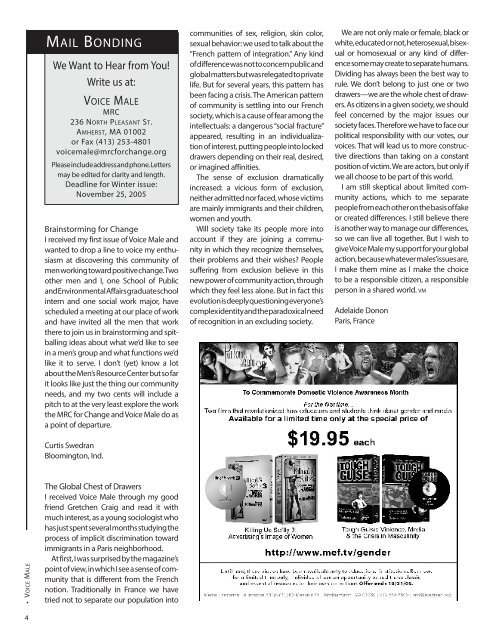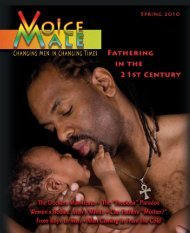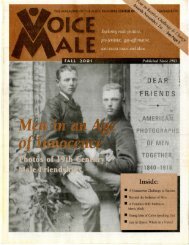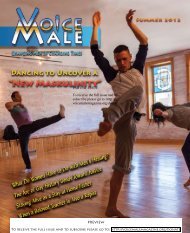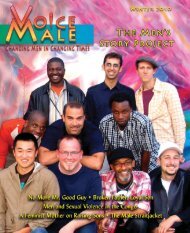to download - Voice Male Magazine
to download - Voice Male Magazine
to download - Voice Male Magazine
Create successful ePaper yourself
Turn your PDF publications into a flip-book with our unique Google optimized e-Paper software.
Mail Bonding<br />
We Want <strong>to</strong> Hear from You!<br />
Write us at:<br />
<strong>Voice</strong> <strong>Male</strong><br />
MRC<br />
236 North Pleasant St.<br />
Amherst, MA 01002<br />
or Fax (413) 253-4801<br />
voicemale@mrcforchange.org<br />
Please include address and phone. Letters<br />
may be edited for clarity and length.<br />
Deadline for Winter issue:<br />
November 25, 2005<br />
Brains<strong>to</strong>rming for Change<br />
I received my first issue of <strong>Voice</strong> <strong>Male</strong> and<br />
wanted <strong>to</strong> drop a line <strong>to</strong> voice my enthusiasm<br />
at discovering this community of<br />
men working <strong>to</strong>ward positive change. Two<br />
other men and I, one School of Public<br />
and Environmental Affairs graduate school<br />
intern and one social work major, have<br />
scheduled a meeting at our place of work<br />
and have invited all the men that work<br />
there <strong>to</strong> join us in brains<strong>to</strong>rming and spitballing<br />
ideas about what we’d like <strong>to</strong> see<br />
in a men’s group and what functions we’d<br />
like it <strong>to</strong> serve. I don’t (yet) know a lot<br />
about the Men’s Resource Center but so far<br />
it looks like just the thing our community<br />
needs, and my two cents will include a<br />
pitch <strong>to</strong> at the very least explore the work<br />
the MRC for Change and <strong>Voice</strong> <strong>Male</strong> do as<br />
a point of departure.<br />
Curtis Swedran<br />
Blooming<strong>to</strong>n, Ind.<br />
communities of sex, religion, skin color,<br />
sexual behavior: we used <strong>to</strong> talk about the<br />
“French pattern of integration.” Any kind<br />
of difference was not <strong>to</strong> concern public and<br />
global matters but was relegated <strong>to</strong> private<br />
life. But for several years, this pattern has<br />
been facing a crisis. The American pattern<br />
of community is settling in<strong>to</strong> our French<br />
society, which is a cause of fear among the<br />
intellectuals: a dangerous “social fracture”<br />
appeared, resulting in an individualization<br />
of interest, putting people in<strong>to</strong> locked<br />
drawers depending on their real, desired,<br />
or imagined affinities.<br />
The sense of exclusion dramatically<br />
increased: a vicious form of exclusion,<br />
neither admitted nor faced, whose victims<br />
are mainly immigrants and their children,<br />
women and youth.<br />
Will society take its people more in<strong>to</strong><br />
account if they are joining a community<br />
in which they recognize themselves,<br />
their problems and their wishes? People<br />
suffering from exclusion believe in this<br />
new power of community action, through<br />
which they feel less alone. But in fact this<br />
evolution is deeply questioning everyone’s<br />
complex identity and the paradoxical need<br />
of recognition in an excluding society.<br />
We are not only male or female, black or<br />
white, educated or not, heterosexual, bisexual<br />
or homosexual or any kind of difference<br />
some may create <strong>to</strong> separate humans.<br />
Dividing has always been the best way <strong>to</strong><br />
rule. We don’t belong <strong>to</strong> just one or two<br />
drawers—we are the whole chest of drawers.<br />
As citizens in a given society, we should<br />
feel concerned by the major issues our<br />
society faces. Therefore we have <strong>to</strong> face our<br />
political responsibility with our votes, our<br />
voices. That will lead us <strong>to</strong> more constructive<br />
directions than taking on a constant<br />
position of victim. We are ac<strong>to</strong>rs, but only if<br />
we all choose <strong>to</strong> be part of this world.<br />
I am still skeptical about limited community<br />
actions, which <strong>to</strong> me separate<br />
people from each other on the basis of fake<br />
or created differences. I still believe there<br />
is another way <strong>to</strong> manage our differences,<br />
so we can live all <strong>to</strong>gether. But I wish <strong>to</strong><br />
give <strong>Voice</strong> <strong>Male</strong> my support for your global<br />
action, because whatever males’ issues are,<br />
I make them mine as I make the choice<br />
<strong>to</strong> be a responsible citizen, a responsible<br />
person in a shared world. VM<br />
Adelaide Donon<br />
Paris, France<br />
• <strong>Voice</strong> <strong>Male</strong><br />
The Global Chest of Drawers<br />
I received <strong>Voice</strong> <strong>Male</strong> through my good<br />
friend Gretchen Craig and read it with<br />
much interest, as a young sociologist who<br />
has just spent several months studying the<br />
process of implicit discrimination <strong>to</strong>ward<br />
immigrants in a Paris neighborhood.<br />
At first, I was surprised by the magazine’s<br />
point of view, in which I see a sense of community<br />
that is different from the French<br />
notion. Traditionally in France we have<br />
tried not <strong>to</strong> separate our population in<strong>to</strong><br />
4


